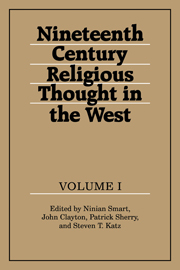EDITORIAL INTRODUCTION
Published online by Cambridge University Press: 05 August 2016
Summary
On both sides of the Atlantic and on both sides of the Channel, there has been in recent years a renewed interest in nineteenth-century religious thought. Reasons for this by now widespread revival of interest need not be rehearsed. It is perhaps sufficient to recall that several issues which dominated discussion in the decades following the European Enlightenment remain central in contemporary debate within the academic study of religion and within the theological community, whether Protestant or Roman Catholic or Jewish. In order to make this point, one need only call to mind such recently debated issues as hermeneutics and tradition, faith and history, projectionist and other reductionist accounts of religion, the limits of historical relativism and the nature of rationality, the possibility of a purely ‘scientific’ study of religion and the legitimacy of theological studies within the university, as well as such religiously intramural concerns as the place of myth in christology or the nature of Jewishness. Each of these problems was either initially raised or significantly recast during the nineteenth century.
Whilst taking care not to underestimate the distance between their world and our own, one must nonetheless allow that greater understanding of these and other contemporary issues can often be gained by attending to those thinkers who in the main have determined the direction of modern religious thought in the West. Theirs was a revolutionary time when the older theistic world-view, already under attack since the Renaissance and throughout the Enlightenment, gave way to a new, more variegated, more complex circumstance for religious thought.
- Type
- Chapter
- Information
- Nineteenth-Century Religious Thought in the West , pp. 1 - 16Publisher: Cambridge University PressPrint publication year: 1985



